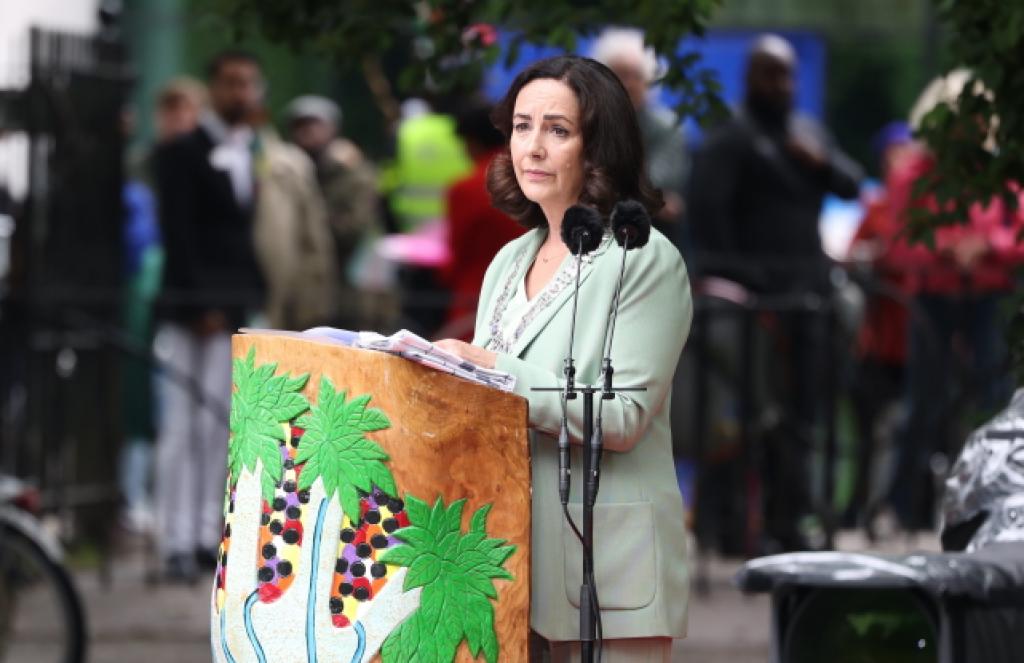Thessaloniki gets ready for its metro launch in November
The underground rapid transit lines have been under construction for almost two decades due to various project delays
 TheMayor.EU logo
TheMayor.EU logo 
Mayor Femke Halsema giving a speech on the role of city officials in slavery and slave trade, Source: City of Amsterdam
City officials have played a key role in the processes of the slave trade, a study finds
The Mayor of Amsterdam apologised for her city’s involvement in slave trade and slavery on the occasion of 1 July - the annual Keti Koti (Emancipation) commemoration. She did so on behalf of the City Council and the College of Mayor and Aldermen.
The council shares the view that the institution is formally responsible for the actions of its predecessors, who played a major and active role in the slave trade and personally benefitted from it. The apology is made as a gesture to descendants of enslaved people, who have long been asking for such recognition.
Slavery has torn families and communities apart and destroyed lives. In addition, racist ideas were disseminated at that time to justify slavery and these still affect the lives of Amsterdammers, as per the municipal website. Even worse, officials representing the Dutch capital have played a major and active role in slavery and the slave trade for almost 300 years while personally benefitting and enriching themselves.
City officials have also facilitated the slave trade and slavery worldwide. From what used to be Dutch East Indies to South Africa, Surinam and New Amsterdam (present-day New York) to other places, the city became infamous for its involvement.
These findings are based on a scientific study, that the City of Amsterdam requested in 2019. In particular, authorities wanted to establish the exact role of the local government in slavery and decide if an apology was appropriate. The study, involving over 40 scientists, concluded with a book titled Slavernij in Oost en West, het Amsterdam onderzoek (which translates to Slavery in East and West, the Amsterdam study) in September 2020.
As a consequence, the city decided to present its apologies on the next Keti Koti commemoration of the slavery past, which takes place in Amsterdam every year.
“Between 1500 and 1880, at least 12.5 million people fell prey to the transatlantic slave trade. They were dragged from their homes, families were torn apart, their freedom was crushed. People were robbed of their surnames, of their history, of their identity. They were humiliated, beaten, killed…
This history has left a legacy in our city. Grand and visible in the historic ring of canals and the wealth of art. Much less visible - and for a long time ignored - in the exploitation then and the inequality of today,” Mayor Femke Halsema’s speech reads.
She further pointed out the finding that the province of Holland was a major player in the trade and exploitation of slaves and that in the 18th century, 40% of economic growth came from slavery. In Amsterdam, almost everyone earned from the colony of Suriname, but not a single person living in Amsterdam today should be blamed for the past.
“As a board, we do take our responsibility for this. This city council is in an unbroken line with the administration of its predecessors. Also, with those regents and mayors, whose actions we abhor. We strive for fair handling of our history. Reconciliation, around a shared past, makes room for a shared future. For the active involvement of the Amsterdam City Council in the commercial system of colonial slavery and the worldwide trade in enslaved persons, I offer, on behalf of the College of Mayor and Aldermen, apologies,” concluded the Mayor's speech.
If you want to keep up with how European cities and regions are changing, follow us on Facebook, Twitter and Instagram.

The underground rapid transit lines have been under construction for almost two decades due to various project delays

Now you can get your wine in Talence by paying directly in Bitcoin

That’s because the state has to spend money on updating the railway infrastructure rather than subsidizing the cost of the popular pass

Rethinking renewable energy sources for the urban landscape

The examples, compiled by Beyond Fossil Fuels, can inform and inspire communities and entrepreneurs that still feel trepidation at the prospect of energy transition

Now you can get your wine in Talence by paying directly in Bitcoin

The 10th European Conference on Sustainable Cities and Towns (ESCT) sets the stage for stronger cooperation between the EU, national and local level to fast track Europe's transition to climate neutrality.

At least, that’s the promise made by the mayor of Paris, Anne Hidalgo

The underground rapid transit lines have been under construction for almost two decades due to various project delays

At least, that’s the promise made by the mayor of Paris, Anne Hidalgo

Hostal de Pinós is located in the geographical centre of the autonomous region

Despite its church-y name, the district has long been known as the hangout spot for the artsy crowds

Urban dwellers across the EU are having a say in making their surroundings friendlier to people and the environment.

Forests in the EU can help green the European construction industry and bolster a continent-wide push for architectural improvements.

Apply by 10 November and do your part for the transformation of European public spaces

An interview with the Mayor of a Polish city that seeks to reinvent itself

An interview with the newly elected ICLEI President and Mayor of Malmö

A conversation with the Mayor of Lisbon about the spirit and dimensions of innovation present in the Portuguese capital














